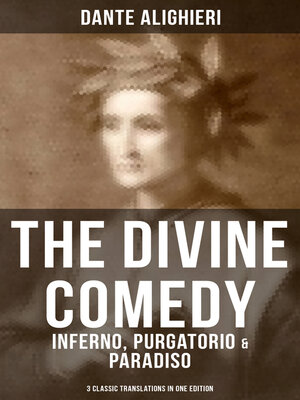THE DIVINE COMEDY
ebook ∣ Inferno, Purgatorio & Paradiso (3 Classic Translations in One Edition): Cary's, Longfellow's, Norton's Translation With Original Illustrations by Gustave Doré
By Dante Alighieri

Sign up to save your library
With an OverDrive account, you can save your favorite libraries for at-a-glance information about availability. Find out more about OverDrive accounts.
Find this title in Libby, the library reading app by OverDrive.



Search for a digital library with this title
Title found at these libraries:
| Loading... |
This epic poem written by Dante Alighieri between c. 1308 and his death in 1321 is widely considered the preeminent work of Italian literature, and is seen as one of the greatest works of world literature. The Divine Comedy serves as the physical (scientific), political, and spiritual guidebook of Dante's Fourteenth Century universe. The poem's imaginative and allegorical vision of the afterlife is a culmination of the medieval world-view as it had developed in the Western Church. It helped establish the Tuscan dialect, in which it is written, as the standardized Italian language. It is divided into three parts: Inferno, Purgatorio, and Paradiso. On the surface, the poem describes Dante's travels through Hell, Purgatory, and Heaven; but at a deeper level, it represents allegorically the soul's journey towards God. At this deeper level, Dante draws on medieval Christian theology and philosophy, especially Thomistic philosophy and the Summa Theologica of Thomas Aquinas. Consequently, the Divine Comedy has been called "the Summa in verse".
Dante Alighieri (1265 – 1321), was a major Italian poet of the Late Middle Ages. His Divine Comedy, originally called Comedìa (modern Italian: Commedia) and later christened Divina by Boccaccio, is widely considered the most important poem of the Middle Ages and the greatest literary work in the Italian language.






